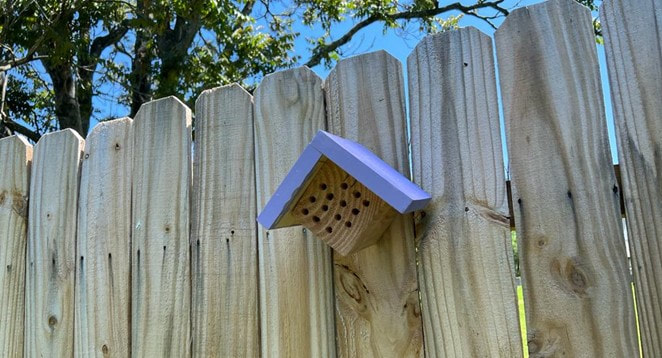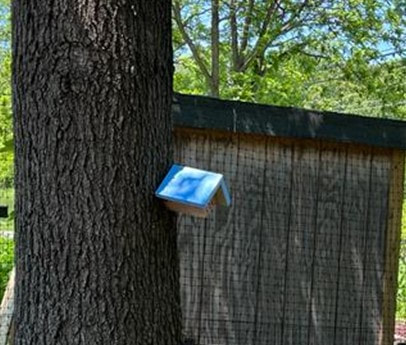|
As you walk across Freetown Farm, you may have noticed small houses hanging on the trees and fences. These are called bee houses, but what are they, and why use them? To understand why bee houses are important for our community, you first need to know the differences between solitary and social bees.
Solitary bees dig holes in wood or soil instead of building hives. Bee houses provide homes for solitary bees, who use the houses instead of making their own tunnels. But why should you use bee houses, and why are they at the farm? Unfortunately, native solitary bee populations are on the decline, and could become endangered in the future. Bee houses help these bees find homes. Bee houses also reduce the damage to property as bees will use the houses instead of burrowing into wooden posts and decks. Solitary bees can help your gardens and farms, as they are more efficient pollinators than honeybees, helping you grow more crops, vibrant flowers, and create a healthy environment. If you want to build the same bee houses, this is the design used: The block of wood with the holes is 6 inches long, and each roof block is 7.25 inches long. Each tunnel is around 4 - 5 inches deep. Make sure that the block of wood with the holes is untreated, as bees are more likely to go into that type of wood. There are many ways to hang the bee houses, but the way used at the farm is with key-hole hangers at the back of the bee house.
Make sure to use a low VOC primer and paint on the roofs. VOC stands for volatile organic compound, and the more there is, the more chemical odor there is, which can repel bees. Avoid colors like red or black as bees could perceive these colors as a threat. Blue and purple are good colors to use. The best place to put bee houses is in spots that get sunlight and are near flowers. They should be at least 3-4 feet from the ground. The 35 bee houses at Freetown Farm were built and installed in June 2023 as part of an Eagle Project lead by Krishna Gawandi, a scout in troop 944. Troop 944 is located in Ellicott City, MD and meets at the Bethany United Methodist Church. Good luck making your own bee houses! Krishna Gawandi Comments are closed.
|
AuthorSThe Community Ecology Institute co-authors the material on this blog with the support of several team members. Categories
All
Archives
July 2024
|




 RSS Feed
RSS Feed
